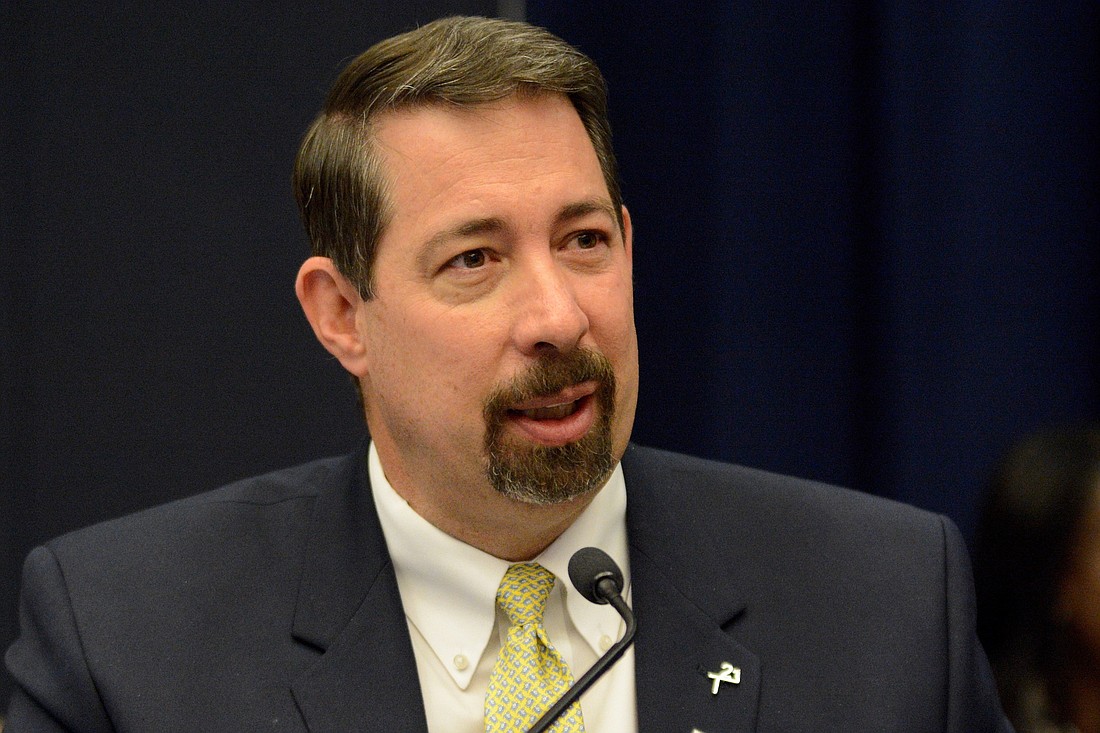- April 26, 2024
-
-
Loading

Loading

The state legislative season starts in just over a month, and the Flagler County government is making sure it's ready — adjusting its priorities for lobbying and planning more frequent meetings about goings-on at the state level. At a County Commission workshop Dec. 4, the county administration laid out the following eight legislative issues as priorities for Flagler County:
As has been the case the last few years, the issue of vacation rental regulations is on the list: Flagler County is fighting to preserve the right to regulate short-term vacation rentals. It had been instrumental in fighting to establish that right in 2014 — a few years after the state had restricted munucipalities' regulatory rights — as county residents frustrated with what they called "mini-hotels" and "McMansions" pushed the county to crack down on disruptive rentals.
The county plans to oppose the current vacation rental bill — House Bill 733 — that would require local governments that want to regulate rentals to regulate all residential properties uniformly.
"This bill — it doesn’t mean the property has to be in rental; it's any residential property whether it’s short-term rented, long-term rented or not rented at all," County Attorney Al Hadeed said at a County Commission workshop Dec. 4.
That would mean that in order to have the right to, for instance, inspect a short-term vacation rental for fire-safety issues, the county would have to similarly inspect all county homes — an intrusive and staff-intensive process. That would be about 60,000 residences, County Administrator Craig Coffey said.
Companion bills before the Senate and the House — Senate Bill 658 and House Bill 585 — stet that tourism tax dollars may be used to "acquire, construct, extend, enlarge, remodel, repair, improve, maintain, operate, or finance public facilities within the boundaries of the county or subcounty special taxing district." The county is concerned that the measure could lead cash-strapped districts to divert tourism money to uses such as transportation infrastructure improvements. The county is opposing the change. "Oppose this bill to prevent drastic changes to a major component of our economy that is working for Floridians," a county staff report on the bill states.
House Bill 3 would mandate that the governing board of counties review select contracts and certifications, and would require the state auditor general to conduct certain audits pertaining to tourism promotion and economic development agencies. It also restricts how boars may spend public money on board members' travel and other expenses, and requires economic development agencies to "avoid, neutralize, or mitigate significant potential organizational conflicts of interest before it enters into a contract." The county is opposing the change, stating in a staff report that it will "severely hinder successful economic development efforts by micromanaging oversight by the state and adding complicated guidelines that lead to competitive disadvantages and conflicts of interest of those that assist us with economic development."
Senate Bill 192 and House Bill 79 specifies the circumstances in which state, county and municipal officials can take part in fact-finding exercises or excursions — for instance, requiring official notice in certain situations and barring officials on such excursions from taking part in votes or agreements on issues that they will be taking public action on in the future, or discussing public business. The bills also require appropriate records — such as minutes or video or audio recordings — be made of such excursions. Flagler County is supporting the legislation.
Senate Bill 574 states that local governments may not: "a) prohibit or restrict a private landowner from trimming, removing, or harvesting trees or timber located on the landowner’s private property. b) Require mitigation, including, but not limited to, the planting of trees or the payment of a fee, for the removal or harvesting of trees or timber from private property. c) Prohibit the burial of trees, shrubs, palmettos, or other vegetative debris on properties larger than 2.5 acres." The county is opposing the bill, stating that it is "not only a loss of Home Rule authority, but also prohibits a community from shaping its appearance through tree protection."
House Bill 7 would require local governments to issue additional public notices and additional reporting and hold additional public hearings for tax increases and new tax-supported debt, and adds reporting requirements for economic development initiatives, according to a county staff report. The county is opposing the bill, according to the staff report, because local governments already have processes to ensure fiscal transparency and the bill "creates additional bureaucracy, costs, and makes the difficult job of governing even harder."
House Bill 299 amends membership requirements for the Florida Building Commission, which implements the Florida Building Code. It would eliminate requirements that the commission include a mechanical or electrical engineer and representatives from the green building industry, from organizations for people with disabilities and from the manufactured home industry, among others. It would add a requirement for representatives from the pool contracting, general contracting and the insurance industry, among others. The county is opposing the measure, according to a county staff report, because "The impacts to local government are disproportionate and tip the balance towards private self-regulation. The current system works well and has created stronger building codes, which has served Florida well during disasters."
House Bill 285 and Senate Bill 488 would exempt municipalities and other government entities that have their own fire rescue infrastructure and first responders from having to apply to their respective counties to get a "certificate of public convenience and necessity," or COPCN, in order to provide non-transport advanced life support services. The county is opposing the bill, stating in a staff report that it could cause "financial or service gaps and/or the potential duplication of services."